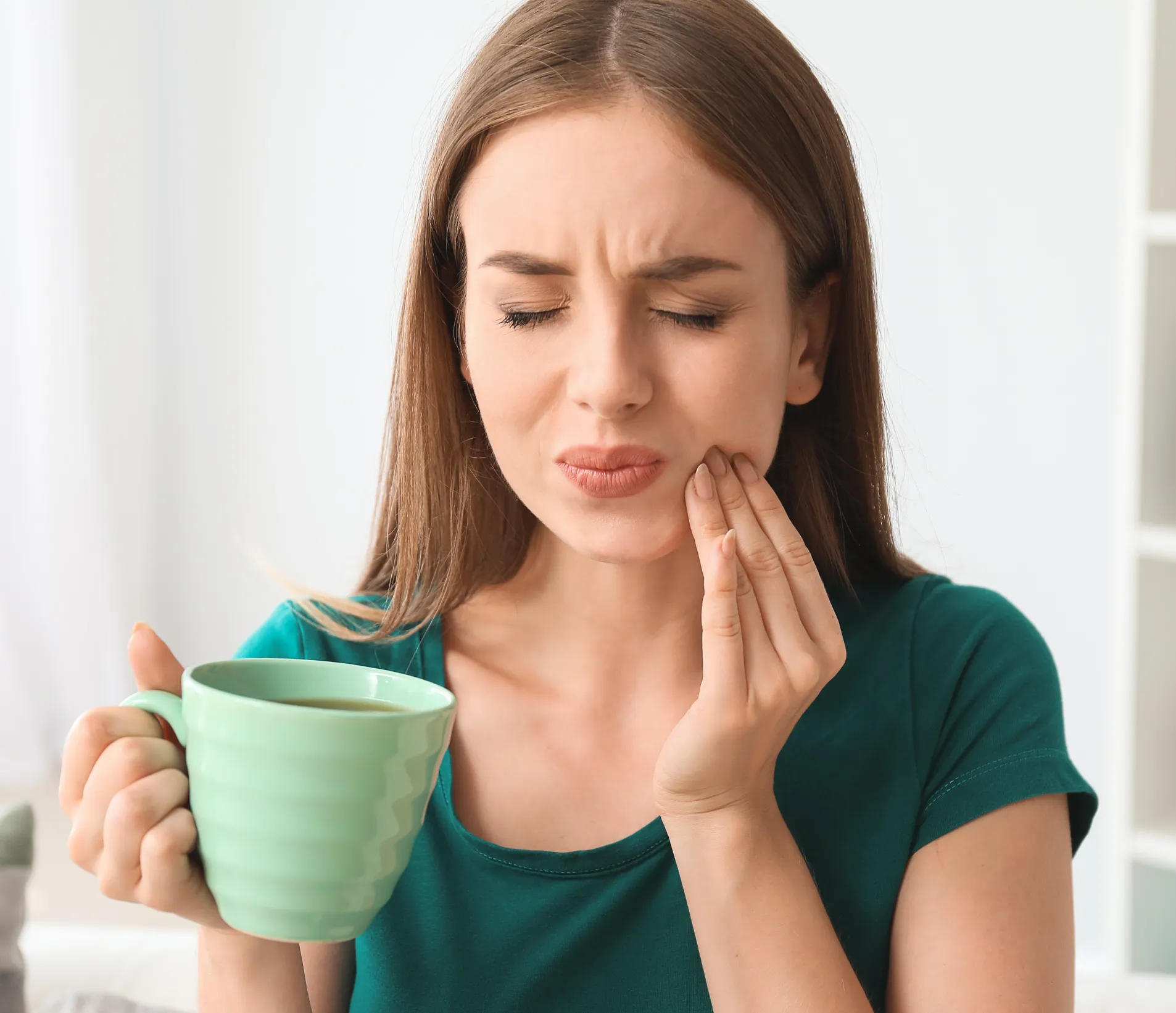.svg)
Whether you're experiencing sharp pain when eating hot or cold foods or discomfort when brushing, sensitive teeth can affect your daily life. Dr. Matthew Yoon and our team are here to help diagnose the cause of your tooth sensitivity and provide effective treatments to relieve your symptoms and restore your comfort.

Tooth sensitivity occurs when the protective layer of enamel on your teeth wears down or when your gums recede, exposing the sensitive dentin beneath. This can lead to discomfort or sharp pain when consuming hot, cold, sweet, or acidic foods and drinks. In some cases, even brushing or flossing can trigger sensitivity.
Tooth sensitivity is common, but it’s not something you should just tolerate. Dr. Yoon will work with you to determine the underlying cause of your tooth sensitivity and recommend appropriate treatments to address the issue, providing you with long-lasting relief.
Enamel is the hard, protective outer layer of your teeth. Over time, the enamel can wear down due to factors such as aggressive brushing, acidic foods and drinks, and aging. When the enamel thins, the underlying dentin becomes exposed, leading to tooth sensitivity.
Gum recession occurs when the gum tissue pulls back from the teeth, exposing the tooth roots. The roots of your teeth are not covered by enamel and are more sensitive to temperature changes, sweet foods, and brushing. Gum recession can be caused by gum disease, aging, or aggressive brushing.
Cavities can cause tooth sensitivity, especially if the decay has reached the inner layers of the tooth. The exposed areas may become sensitive to hot, cold, and sweet foods. If you suspect you have a cavity, it’s important to visit the dentist for a check-up and treatment.
A cracked or broken tooth can lead to tooth sensitivity, especially if the crack extends to the inner layers of the tooth. When the tooth is compromised, it may become more vulnerable to temperature changes and pressure.
Grinding your teeth, often during sleep, can wear down the enamel and lead to increased sensitivity. If you notice that you grind your teeth, especially at night, Dr. Yoon may recommend a nightguard to protect your teeth.
Certain dental procedures, such as fillings, crowns, or teeth whitening treatments, can cause temporary sensitivity. This typically resolves on its own within a few days or weeks, but if the discomfort persists, it’s important to follow up with Dr. Yoon.
If your tooth sensitivity is mild, using a desensitizing toothpaste can help block the pain signals from reaching the nerves in your teeth. These toothpastes contain compounds that help reduce sensitivity and provide relief over time. Dr. Yoon may recommend specific brands or types of toothpaste based on your needs.
Fluoride treatments can help strengthen tooth enamel and reduce sensitivity. We may apply a fluoride gel or varnish to the sensitive areas of your teeth to promote remineralization and protect the exposed dentin. This treatment can be especially helpful if your sensitivity is related to enamel erosion.
If gum recession or enamel erosion has exposed the sensitive areas of your teeth, dental bonding may be an effective solution. A tooth-coloured resin is applied to the affected areas, covering the exposed dentin and protecting it from temperature changes.
For severe cases of gum recession, gum grafting may be necessary to restore the gum tissue and protect the tooth roots. During this procedure, tissue from another part of your mouth is used to cover the exposed roots, reducing sensitivity and improving the appearance of your gums.
If your tooth sensitivity is caused by damage or infection deep within the tooth, a root canal may be required. This procedure involves removing the infected tissue and sealing the tooth to prevent further sensitivity and discomfort.
If you grind your teeth at night, Dr. Yoon may recommend a custom-made nightguard to protect your teeth from further damage and reduce sensitivity caused by grinding.
If you're experiencing tooth sensitivity, the first step is to schedule a consultation with Dr. Yoon. We will perform a thorough examination to determine the cause of your sensitivity. This may include X-rays to assess your tooth health and check for cavities, gum recession, or other issues.
Once we’ve identified the cause of your sensitivity, Dr. Yoon will develop a personalized treatment plan tailored to your specific needs. We’ll discuss your options, including lifestyle changes, treatments, and home care recommendations to alleviate your symptoms and prevent further issues.
Depending on the severity of your sensitivity, we may start with a simple fluoride treatment or recommend more advanced options like gum grafting or dental bonding. We’ll ensure that your treatment is comfortable, effective, and designed to provide long-term relief. Follow-up appointments may be necessary to monitor your progress and make any adjustments.
Tooth sensitivity is most commonly caused by worn enamel, gum recession, cavities, cracked teeth, and teeth grinding. Aggressive brushing, acidic foods, and poor oral hygiene can also contribute to sensitivity.
To prevent tooth sensitivity, practice good oral hygiene, avoid aggressive brushing, use a soft-bristled toothbrush, and avoid consuming too many acidic foods or drinks. If you're prone to grinding your teeth, wearing a mouthguard at night can also help protect your teeth.
While tooth sensitivity can often be managed with treatments like fluoride, desensitizing toothpaste, or bonding, in some cases, addressing the underlying cause of the sensitivity (such as cavities or gum recession) can eliminate it completely. Dr. Yoon will work with you to develop a treatment plan that addresses your specific situation.
Yes, desensitizing toothpaste is generally safe to use for managing mild tooth sensitivity. It contains compounds that help block pain signals from reaching the nerves in your teeth. However, if your sensitivity persists, Dr. Yoon may recommend additional treatments.
If your tooth sensitivity is persistent or severe, or if it’s affecting your ability to eat or drink comfortably, it’s important to visit a dentist. Sensitivity can be a sign of an underlying issue, such as cavities, gum disease, or a cracked tooth, and early treatment can prevent further damage.